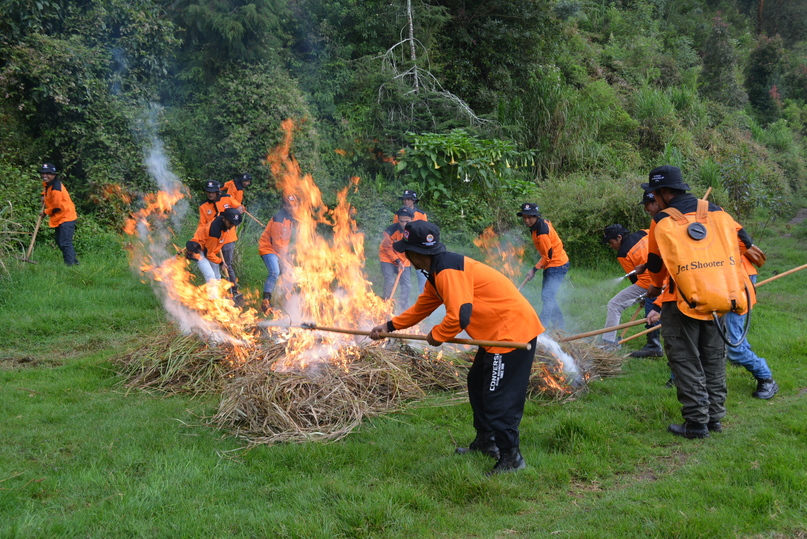Webinar explores lessons on fire management in Indonesia
6 August 2021

Members of the Sungai Awan Kiri community in Kalimantan, Indonesia, receive training on fire prevention and suppression. Photo: Directorate Forest and Land Fire Management, MoEF
Yokohama, 6 August 2021: Indonesia’s devastating forest fires in 1997/98 and 2015 burnt 9.7 million and 2.6 million hectares, respectively. Since then, however, the country has reduced fire occurrence, with fewer than 300 000 ha affected in 2020. A recent webinar held as part of an ITTO project explored Indonesia’s learnings—including the importance of involving communities in fire prevention.
The webinar, “Forest Fires in Southeast Asia: Policy and Research Development in Indonesia”, held on 21 July 2021, had about 200 participants, mainly from Southeast Asia but also Japan, the Republic of Korea and elsewhere. ITTO’s co-organizer was the Directorate General of Climate Change, Indonesian Ministry of Environment and Forestry (MOEF), with collaboration from the Regional Fire Management Resource Center-Southeast Asia at Bogor Agricultural University. The webinar was the first in a series of fire-related webinars on forest fire in Southeast Asia sponsored by an ITTO project funded through the Japanese Government’s initiative, “Emergency Support to Large-scale Forest Fires in the Amazon Region and Indonesia”.
Speakers at the webinar agreed it is crucial to involve local communities and other stakeholders in crafting policies and strategies on fire prevention, suppression and post-fire management. A key approach, therefore, is to encourage and increase the participation of communities, the private sector, non-governmental organizations and international partners. Driven by President Jokowi’s direction to intensify synergy and coordination among stakeholders, Indonesia has developed “fire communities” in 26 provinces and “fire care community paralegals” in 40 villages in seven provinces.
In her opening remarks, Laksmi Dhewanthi, MOEF Director General of Climate Change, said that the current momentum for reducing forest fire must be continued because considerable challenges remain.
“We need to increase fire prevention efforts to further suppress fire occurrences, so that haze pollution may be eliminated, as per Indonesia’s commitment to meet a haze-free ASEAN,” she said.
Mr Basar Manulang, MOEF Director of Forest and Land Fires Management, reported on Indonesia’s policy and programme on forest and land fire prevention. He stressed the important role of local communities as frontliners in combating forest and land fires.
Professor Bambang Hero Saharjo, a well-known forest fire scientist at Bogor Agricultural University, said that addressing the problem of forest fire also requires science-based field experiments to get a clear understanding and reduce risks.
Webinar participants agreed on the importance of coherent, synergized and coordinated policy implementation with strengthened community participation and ecosystem resilience in improving forest fire management.
Speaking at the close of the webinar, ITTO Projects Manager Tetra Yanuariadi thanked speakers and participants for the informative discussion. He expressed hope that participants had learnt something new, found something they wanted to know more about, and heard something that challenged them to work more on combating forest wildfire.
The next webinar, which will be held on 26 August 2021, will discuss forest fire prevention actions in ASEAN countries. Under the ITTO project, webinars on forest fire management—which are open to the public—will be held monthly until January 2022. Contact ITTO for more information.
Watch the webinar recording
